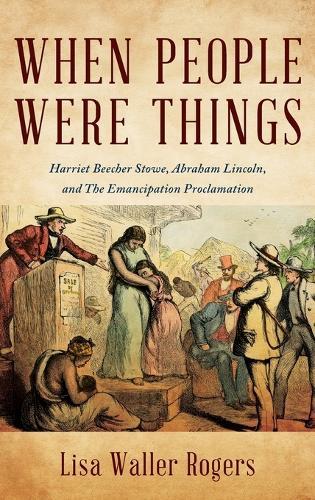Full Product Details
Author: Lisa Waller Rogers
Publisher: Barrel Cactus Press, Inc.
Imprint: Barrel Cactus Press, Inc.
Dimensions:
Width: 15.20cm
, Height: 3.70cm
, Length: 22.90cm
Weight: 1.070kg
ISBN: 9798999409621
Pages: 682
Publication Date: 01 September 2025
Audience:
General/trade
,
General
Format: Hardback
Publisher's Status: Active
Availability: Available To Order

We have confirmation that this item is in stock with the supplier. It will be ordered in for you and dispatched immediately.
Reviews
Advance Praise from Publishers Weekly (https: //booklife.com/booklife-review/9798999409614) When People Were Things: Harriet Beecher Stowe, Abraham Lincoln, and the Emancipation Proclamation Rogers, Lisa Waller This intimate epic surveys, with novelistic flair, the lives of men and women, free and enslaved, famous and forgotten, who dared to stand up against slavery in the United States in the years leading up to the Civil War, often at the risk of their own lives. In 100 brisk but rich chapters, Rogers strives to put readers into the shoes of her principal subjects, Harriet Beecher Stowe and Abraham Lincoln, but also a host of abolitionists, formerly enslaved people, and more, in the fractious years between Stowe's birth in 1811 and Lincoln's signing of the Emancipation Proclamation at the dawn of 1863-Stowe, Rogers notes with significant narrative and moral power, did not doubt that the president would measure up to his moment. Between those events, Rogers dramatizes key moments from myriad lives (among them Theodore Weld, Sojourner Truth, August Wattles, Charles Sumner, Marius Robinson, Paul Edmonson, Harriet Tubman, and many more). The storytelling is inviting and detailed, brought to life with judicious quotes and an eye toward still-pressing themes: mob violence, as decried by both young Lincoln and Stowe; the ""revolutionary concept"" that women ""could change society""; the courage of abolitionist truth-tellers; the ""monstrous moral wrong"" of slavery; and a Southern-controlled Congress's anti-democratic efforts to silence abolitionists. The subject matter is sweeping, the page count daunting, and the telling at times revelatory, especially when Rogers captures how life felt-and how her cast's convictions were sharpened-as the nation came to a fierce boil. At times, though, the novelistic approach works against narrative momentum and contextualization, with chapters and sections, especially in the first half, opening with breezily precise bits of declarative scene-setting about mundane happenings that readers must trust will eventually gain significance. The choice to weave in-depth biographical accounts of Stowe's family and Lincoln's marriage-while mostly leaving the content and wildly popular theatrical adaptations of Uncle Tom's Cabin unexamined-leaves readers to seek that context elsewhere. Takeaway: Intimate, epic history of Stowe, Lincoln, and the enslaved as the nation came to a boil. Comparable Titles: Joan D. Hedrick's Harriet Beecher Stowe: A Life, Stanley Harrold's American Abolitionism.



